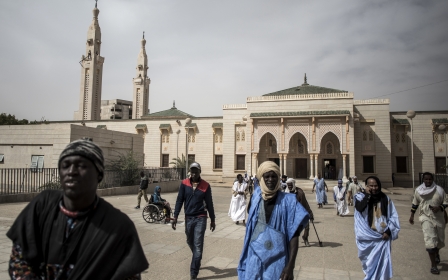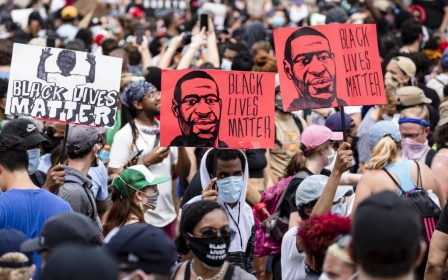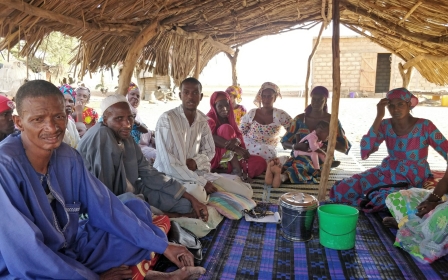Mauritanian police accused of racism after kneeling on neck of Black man

Mauritanian police officers have been accused of “behaving like American police” after kneeling on the neck of a Black man, the same restraint technique that led to the death of George Floyd in Minneapolis last month.
An image of two policemen pinning the man to the ground circulated over the weekend, prompting an outcry against racism and police brutality in the majority-Black country dominated by an Arab-Berber elite.
Mauritanian activists told Middle East Eye that the incident was a sign that the West African country still had “a lot of work to do before Black lives matter”, echoing the name of the protest movement highlighting racism in the US and worldwide.
According to eyewitnesses, officers arrived at around 11am on Saturday to a street close to the Sixieme (sixth) neighbourhood in the capital Nouakchott to make an arrest. A photo taken by a passerby soon after shows a crowd of people watching as two police officers in fatigues restrain a man lying prostrate on the edge of the road.
One officer is kneeling on the man’s shoulder, while the other is kneeling on his neck, reminiscent of the hold that led to the death of Floyd on 25 May that sparked huge and continuous protests in the United States and several other countries.
Abdoulaye Sow, from the US-based Mauritanian Network for Human Rights, said that image was a “powerful” reminder of racism in the country
“This image reminds us of what happened to George Floyd, but it also reminds us that we have a lot of work to do in Mauritania.”
Brahim Bilal Ramdhane, who runs the Nouakchott-based Sahel Foundation human rights organisation, said he was lodging a complaint about the conduct of the police officers.
“They behaved like the American police,” he said.
Middle East Eye understands that the man, 26, was suspected of theft and tried to evade arrest. He was arrested and remains in police custody.
MEE contacted the Mauritanian government for comment but did not receive a response.
However, in an email received after this article was published, the Mauritanin government's Office of the Commissioner for Human Rights, Humanitarian Action and Civil Society Relations told MEE that police had deployed a "lawful restraint technique" in arresting the man.
"Mauritania is a country of law that respects human rights and cherishes their promotion and protection. Our law prohibits all incitement to acts of racism," it said.
Black Mauritanians have continually campaigned against institutional racism in a country where tens of thousands of still languish in what the United Nations describes as “de facto slavery”.
A 2009 report by the UN found that the society has been “deeply marked by continuing discriminatory practices of an ethnic nature… pervasively present in social structures, the principal institutions of the state, in particular the armed forces and justice system, and attitudes”.
MEE reported earlier this month the death of Abbas Diallo, an unarmed Black Mauritanian who was gunned down by security forces near Mauritania’s southern border with Senegal.
Meanwhile, in May a video emerged of police beating unarmed Black Mauritanian protesters in the streets.
The incidents have spurred Black Mauritanians to find common cause with the global anti-racist movement that has sprung from the death of George Floyd. However, Mauritanian authorities have refused to give permission for activists to stage a sit-in in front of the vast US embassy in Nouakchott on the grounds of coronavirus restrictions.
Instead a virtual campaign in solidarity with Black Lives Matter and against Mauritanian police violence is set to launch on Tuesday.
In a statement released ahead of the launch, the Sahel Foundation urged Mauritanian authorities to “directly and aggressively” fight “all forms of discrimination, exclusion and marginalisation and, in particular, those resulting from the practices and mentalities linked with slavery and state racism”.
Mauritania is a key regional counterterrorism ally of Washington and this year hosted Flintlock, a US-led military training exercise involving the police and armed forces of more than 30 nations.
Sow, who is also an American citizen, said: “Our tax money is going to help train Mauritanian military and police officers, but as you can see they are not receiving the proper training because they are not respecting the human rights of Black people."
Middle East Eye delivers independent and unrivalled coverage and analysis of the Middle East, North Africa and beyond. To learn more about republishing this content and the associated fees, please fill out this form. More about MEE can be found here.





